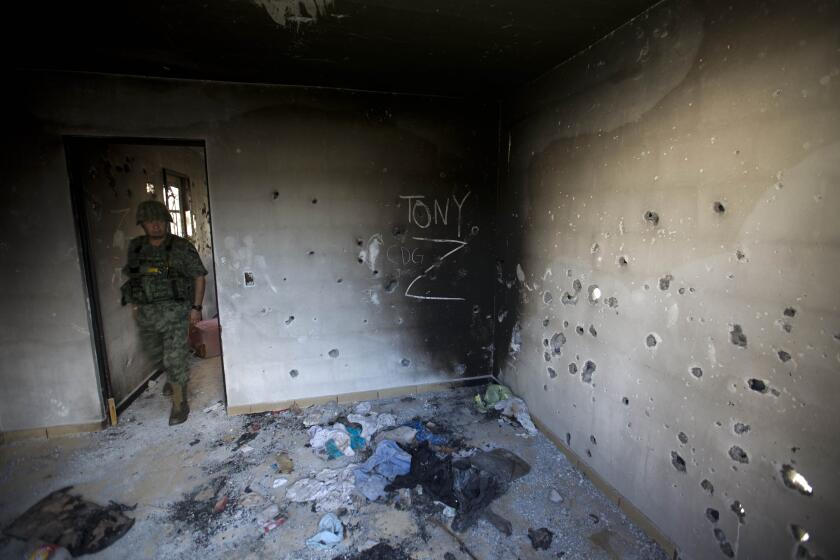PERSPECTIVES ON BOSNIA : Are We Prepared to Go the Distance? : Slowly escalating the military pressure on Serbia will work only if America is prepared to occupy Belgrade.
American outrage over the suffering of the Bosnian people and our own moral failure to act firmly to prevent it is impelling the President to consider air strikes against Serbian artillery batteries. Many desk officers at the State Department are said to be pushing for stronger military intervention. The Pentagon is dragging its feet. Unless and until the Administration clarifies objectives and strategy, wariness is warranted.
It is seductively easy to advocate air strikes. Maybe the Serbs will quit in the face of such steps. In fact, they probably won’t. Attacks on artillery might have the temporary military effect of slowing their onslaught against this besieged city or that town, but they will not stop the Serbs in the long run. This is a war of foot soldiers, thugs really, carrying guns and murdering innocents. They will miss whatever artillery we may take out, but they will not be stopped.
Those who advocate such steps, however, believe demonstrations of resolve by the United States and Europeans will increase the pressure on the Serbs, cause them to alter their course and lead to a diplomatic solution. Those familiar with the rhetoric surrounding American strategy in Vietnam or with NATO nuclear strategy during the Cold War will recognize an escalation strategy: We will increase pressure until the enemy recalculates the costs associated with his actions and decides to quit.
There is nothing wrong with an escalation strategy. It’s sensible to try to achieve objectives with as little military force as possible. But the strategy will not work unless we are clear about our political objectives and prepared to do whatever it takes militarily to achieve them if successive steps on the escalation ladder fail to do so. In short, we’ve got to be ready to go to the top of the escalation ladder, even though we’d prefer to stay near the bottom.
The Slobodan Milosevic government aims to create a greater Serbia incorporating much of Bosnia. If the West wants the killing to stop, its choices are simply these: stand by while they finish their bloody job or try to persuade the Serbian government to disarm its warlords and settle for an independent Bosnia. The United States and the European Community say the first is unacceptable. But the second probably requires a different Serbian government. The military objectives implied by that political aim could include a ground force drive on Belgrade and occupation of both that capital and the countryside.
Unless we are prepared to confront and accept such military implications, the escalation strategy will not work. But perhaps only a few escalatory steps beyond strikes on artillery (such as air strikes on targets in Serbia itself) coupled with other actions, such as lifting the arms embargo against Bosnia and tightening the economic blockade along the Danube, could cause the Serbs to quit fighting and negotiate a settlement.
These are hard things for political leaders to confront. No one wants to talk about occupying Belgrade and pacifying the countryside. This might take three or four divisions and tens of thousands of occupation troops. But the fact that we have been unwilling to face up to these realities is the reason the Serbs have not been impressed by the moves we’ve made so far, such as the no-fly zone. It is why they will not agree to the Vance-Owen plan which, whatever its flaws, would thwart their ambition of a greater Serbia.
This is the grim choice the Administration must face while commentators glibly speak of air strikes. On moral and strategic grounds, escalation is right. The West’s security would be seriously eroded by the creation by force of a rogue state in the Balkans and the likely spread of ethnic conflict both northward and southward. But the American people may not have the stomach for such far-reaching objectives.
Certainly the Europeans don’t. They have been especially feckless in recent weeks. The German government, for example, had to endure a constitutional crisis over whether German airmen could fly in the NATO surveillance planes helping enforce the no-fly zone. We can be sure they will not join us in an escalation strategy. Should American do it without Germany? Without any European support? The worst thing to do is to slide into an escalation strategy without being willing to climb the entire ladder. We could find ourselves in the worst possible situation--engaged in Bosnia, unwilling to finish the job militarily and thus unable to finish it politically.
This is the deepest fear of the American military. Another quagmire, another Vietnam. President Clinton faces a much tougher decision than implied by the current chatter about air strikes. He must decide on our objectives and generate the will to do what is necessary to achieve them.
More to Read
Sign up for Essential California
The most important California stories and recommendations in your inbox every morning.
You may occasionally receive promotional content from the Los Angeles Times.










